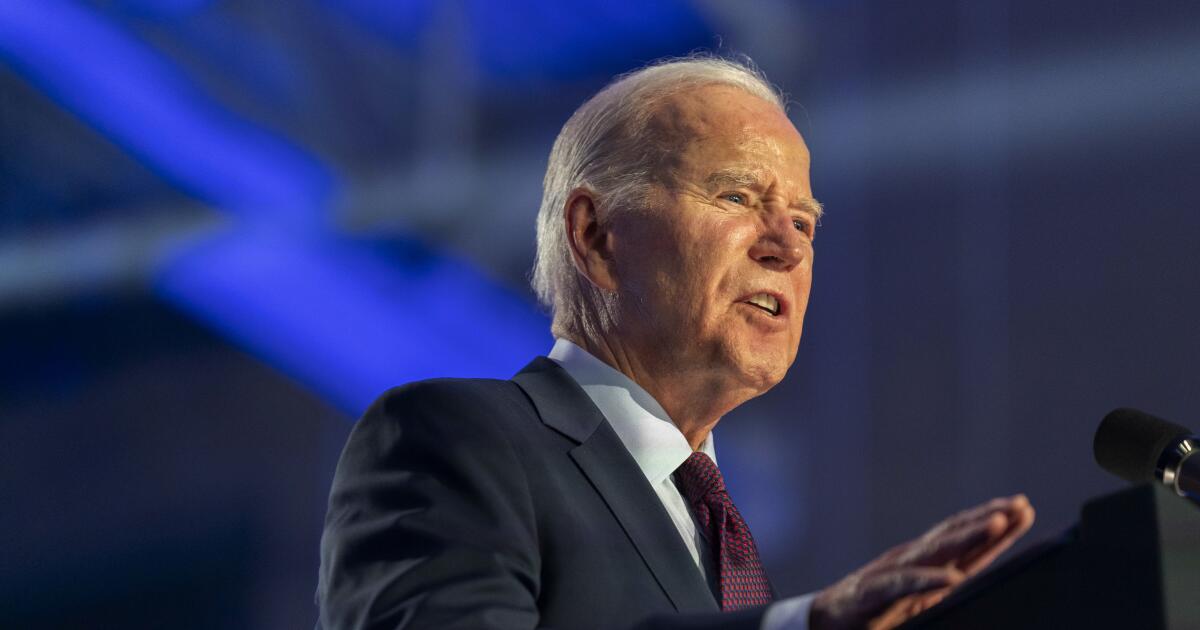Joe Biden is old. Like each of us, he comes from a particular place in history, in his case the LBJ years. And that’s one big reason why his first term has been so full of accomplishment: His age, often cited as the greatest obstacle to his reelection, is actually his superpower.
There was never much question that Third Act, the progressive organizing group for people over 60 that I helped found, would end up endorsing President Biden for reelection. We campaign to protect our climate and our democracy, and so the chances we would back Donald Trump — who pulled us out of the Paris climate accords and helped mount the Jan. 6 insurrection — were nil. (Nikki Haley, another no-go, strenuously backed Trump’s Paris pullout.)
Biden, on the other hand, is a scrupulous small-d democrat. His record on climate isn’t perfect, but he has helped jump-start renewable energy development, and just last month he showed real bravery in standing up to Big Oil and pausing new permits for LNG — liquid natural gas — export.
Still, individual policy decisions don’t explain why my organization’s members are drawn to Biden. It’s not that we reflexively like older politicians; we take seriously the need to pass the torch to a new generation. But we also don’t unthinkingly dismiss anyone just because they can collect Social Security. Obviously you lose a step physically as you age, but the presidency doesn’t require carrying sofas up the White House stairs. And science increasingly finds that aging brains make more connections, perhaps because they have more history to work with.
It’s the specifics of that history that really draw us in.
The first presidential election in which Joe Biden was eligible to vote featured Lyndon Johnson beating Barry Goldwater. History remembers LBJ’s presidency as chaotic because of his tragic adventuring in Vietnam, but in other respects it was remarkable. His Great Society echoed Franklin Roosevelt’s New Deal (FDR was Biden’s childhood president). Under Johnson, the federal government took ambitious steps to advance civil rights, to rein in poverty, attack disease, beautify human landscapes and conserve wild ones, and to further science — these were the Apollo space program years. Not every project worked, but lots have lasted: Medicare, Medicaid and food stamps, for instance.
So Biden was socialized in an era when government took on big causes, and you can see it reflected in his first-term commitment to rebuilding infrastructure on a grand scale, boosting a new sustainable energy economy with billions of dollars for solar panels and battery factories, dramatically increasing the number of people with healthcare, and standing up for gun control, voting rights and reproductive rights.
This propensity to go big is different from his immediate predecessors.
Barack Obama first got to vote in the Carter-Reagan election of 1980, a landslide for Reagan that repudiated an active role for Washington in domestic policy, replacing it with the idea that government was the problem, and that the free market solves all problems. Reagan’s triumph was so complete that it altered for a long while the boundaries of our political life: When Obama, at the end of his time in office, was asked why even with 60 Democratic senators at his inauguration his policy achievements — Obamacare excepted — had been relatively modest, he cited a “residual willingness to accept the political constraints that we’d inherited from the post-Reagan era. … Probably there was an embrace of market solutions to a whole host of problems that wasn’t entirely justified.”
Biden simply doesn’t have that residual Reaganism; his political makeup was formed before the Reagan revolution. He watched a booming economy in the Johnson years that narrowed the gap between poor and rich. Reagan’s economic boom benefited the rich. Now Biden is back in LBJ mode, and the gap has — for the first time in decades — begun to narrow again.
What are Trump’s political influences? What presidency might be his model? He first got to vote in 1968’s tilt between Hubert Humphrey and Richard Nixon. He didn’t inherit any of Nixon’s few good qualities (he founded the Environmental Protection Agency, for instance). Trump mainly seems to have adopted Nixon’s endless sense of victimization, not to mention his willingness to break the law on his own behalf.
The commitment to the principles of the New Deal and the Great Society — to the idea of America as a group project, not a series of isolated and individual efforts at personal advancement — are what we desperately need. Turning over all important decisions to “the market” has left us on a planet with melting poles and cartoonish levels of inequality.
Johnson, of course, wasn’t reelected; with the war in Vietnam raging, he didn’t even run. Biden appears to have remembered that too, with his forthright decision to finally get us out of Afghanistan. Now Gaza may be the kind of inhuman quagmire that could still bring him down.
That would be a shame, because given another four years Biden might well be able to restore confidence in an America that has so destructively turned on itself.
Age matters. My cohort agrees. Why did Biden believe he could do what he did in his first term? Because he’d seen it done. Let’s hope the politicians of the future are watching his successes closely.
Bill McKibben is Schumann Distinguished Scholar in Environmental Policy at Middlebury College and founder of Third Act.

